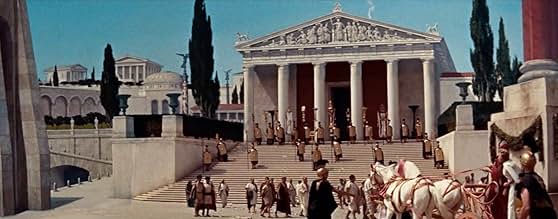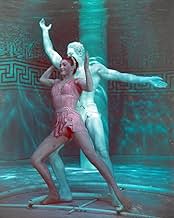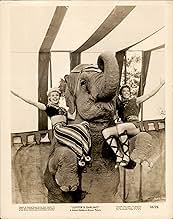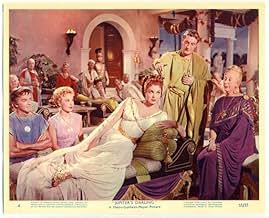Fabius loves his beautiful but vulnerable city, Rome, and he also loves his beautiful but invulnerable fiancée, Amytis. Fascinated by the tales she has heard about Hannibal, who is about to ... Read allFabius loves his beautiful but vulnerable city, Rome, and he also loves his beautiful but invulnerable fiancée, Amytis. Fascinated by the tales she has heard about Hannibal, who is about to attack Rome, Amytis is driven by curiosity to the edge of his camp. Captured, she makes a ... Read allFabius loves his beautiful but vulnerable city, Rome, and he also loves his beautiful but invulnerable fiancée, Amytis. Fascinated by the tales she has heard about Hannibal, who is about to attack Rome, Amytis is driven by curiosity to the edge of his camp. Captured, she makes a last request of the indifferent Hannibal...that he spare the city. She offers to lead him ... Read all
- Director
- Writers
- Stars
- Cpl. Ballol
- (uncredited)
- Soldier
- (uncredited)
- Citizen
- (uncredited)
- Slave
- (uncredited)
- Citizen
- (uncredited)
- Director
- Writers
- All cast & crew
- Production, box office & more at IMDbPro
Featured reviews
It is a shame that 'Jupiter's Darling' wasn't better than it was. By all means, it is not a terrible film and not as bad as its notorious financial flop suggests. It does have many pleasures and the reasons for seeing the film in the first place come off well. This said, all have done much better, despite loving Keel and Sanders to death 'Jupiter's Darling' was seen as someone in the process of watching and reviewing every Esther Williams musical and it is one of my least favourite of hers along with 'Texas Carnival'.
Williams certainly isn't one of the problems, in fact she is in her serenely beautiful Amazonian prime and her aquatic skills second to none and the envy of many. Neither is Keel, who is masculine, commanding and charismatic and sings with his usual warm beauty and robust brio, especially in "Never Let the Night Get Away" where he is quite touching. The two click together superbly. Sanders is his usual suave and smooth self, yes even in a role pretty far removed from the types he excelled at (villains and cads), while Richard Haydn is amusing and Marge and Gower Champion are a delight.
That's not all though. The highlight is the truly spectacular water ballet in "I Had a Dream", one of Williams' best and most visually stunning water ballets. The chase sequence is also impressive. Marge and Gower Champion have two notable song and dance numbers and do a terrific job with both. "Life of an Elephant", which sees them dancing with painted elephants, is to be seen to be believed, though some may prefer the more energetic and less lengthy "If This Be Slavery".
Visually, 'Jupiter's Darling' is the very meaning of lavish, the use of CinemaScope, rich bold colours and inventive use of wide-screen are just exemplary, "I Had a Dream" being the standout in this regard. The costumes and sets are very handsome too.
However, the songs and score are only at best serviceable and generally forgettably substandard, the rousing "Hannibal's Victory March" and the touching "Never Let the Night Get Away" being exceptions. The rest have not-easy-to-remember melodies and sometimes very silly lyrics, some like in "Never Trust a Woman" being questionable. Choreographically, "I Had a Dream" and the Champions' numbers impress but the rest lumber and look under-rehearsed.
Storytelling is uneven, sometimes it moves quickly and has great energy but other parts are ponderous, and there is a sense that the film was trying to mix too many styles and genres and it never quite came together. Worst of all is the script, which is impossible to take seriously even in moments that are meant to be serious and even when you are taking the film for what it is, if Keel and Sanders really did have the giggles during filming that's hardly surprising. Sidney's direction is competent but uninspired.
Overall, difficult to rate but with enough pleasures to make it watchable. 5/10 Bethany Cox
This film is about one of history's great military failures - Hannibal Barca, the Carthagenian tactical genius who is remembered for bringing his army over the alps (including his elephants - a feat of arms that is still marvelled at). He was of Phoenician ancestry, being from the city of Carthage in North Africa (founded by the Phoenicians). He probably was dark skinned, like most North Africans. He probably did not look like Howard Keel, a good actor and singer (KISS ME KATE, CALAMITY JANE - the latter as Wild Bill Hickok, THE DAY OF THE TRIFFIDS). Since this is a musical comedy the audience will swallow it, but from a historical realistic view the role cried for a singer and actor with a darker skin - someone like Paul Robson. However, for age reasons and political reasons Robson would have been impossible in 1955.
The basis of this film is Robert Sherwood's play, THE ROAD TO ROME, which was a comedy against war. Actually beyond this is the fact that Hannibal, having won five great victories against the Romans (capped by the total routs of Roman arms at Lake Transemene and Cannae) had the "road to Rome" open for his army - had he moved he would have destroyed Rome, and history would have been centered in North Africa for quite awhile. His dawdling lost him his chance, and the tactics of the Roman General Fabius Maximus (to snipe at Hannibal's army over a long period of time, until it was tired and demoralized) won the war after a decade. Fabius was killed in a skirmish, but his place was taken by Scipio Africanus, who delivered the knock-out blow at Zama in 202 B.C. Hannibal fled Carthage, to commit suicide in Macedonia a number of years later when he was about to be handed over to the Romans. Carthage was stripped of it's power and wealth, but nearly sixty years later it was purposely destroyed by the Romans (at the prodding of Cato the Elder, a bigotted Senator) in the pointless Third Punic "War". The population was killed or enslaved, and the town levelled - the site ploughed over with salt so nothing would ever grow there. Hence the bitter term: "Carthagenean Peace". But the memory of Rome's close call at the hands of this genius was a constant nightmare even at the height of their empire. In the AENIAD, Vergil has the doomed North African princess Dido die, praying that her descendant (Hannibal) destroys the Romans. Prior to the collapse of the Empire at the hands of "barbarian" tribes Hannibal was Rome's closest call to destruction.
This play may have been good in 1927, but it dates now. Moreover, Sherwood, despite some stage credits like IDIOT'S DELIGHT, is best remembered for his dual biography (which is still useful) ROOSEVELT AND HOPKINS, about FDR and his advisor Harry Hopkins. Keeping this in mind, my use of the term "minor" is understandable. It is not like a musical based on, say a play by Eugene O'Neill or Tennessee Williams. [Actually O'Neill plays have been turned into musicals: NEW GIRL IN TOWN is based on ANNA CRISTIE, and AH WILDERNESS! was turned into the musical TAKE ME ALONG.]
Williams and Keel are attractive together, but the Burton Lane score is not that good (a number with Marge and Gower Champion about the elephants seems very silly now). George Sanders gives his normally good performance, his Fabius being a mother-dominated type (momma is Norma Varden, who disapproves of his choice of Williams as a wife), but who is an intelligent military leader - witness how he realizes that the best way to fight Hannibal is not to present a pitched battle, but to wear him down. The action of the film is in 217 B.C., when the war was peaking for Hannibal, and Fabius did not die for nearly six years more. Interestingly enough Douglas Dumbrille has a brief part as Scipio, reminding us that the military affairs would remain in highly capable hands at the end. William Demerest is properly flustered a few times, constantly ready to give the signal for the final advance of the Carthageneans on Rome, only to find Hannibal unavailable or unwilling to tell him to do so. One wishes more had been done with Richard Haydn, as a historian named Horatio, but he seems wasted here. A film curiosity - not a great film though.
When Esther Williams sings "I Had a Dream", you might be surprised to hear her sing. I was. Then I learned that it was dubbed by Jo Ann Greer. Good choice of singer, because it sounds like Esther's voice. Note that she sings while swimming. That's a little awkward. And then the number turns (appropriately) into a dream sequence. Even if you find the film less than excellent, it's a number that is interesting--filmed to give the illusion that it was done without coming up for air.
Howard Keel, as Hannibal, is the romantic interest. He lends his booming voice to some silly lyrics. I had the recurring impression I was listening to The Grinch.
Another interesting thing: the opening line of one song ("Don't Let This Night Get Away") sounded remarkably like the opening line of "A Woman in Love" from "Guys and Dolls", released the same year.
Besides the underwater dance sequence I mentioned, there is another that is worth seeing for its uniqueness. Marge and Gower Champion sing "The Life of an Elephant" while dancing among elephants that perform tricks. Both sequences must have been tedious to film.
One element that that I found superior throughout was the costuming.
It's a silly movie but an enjoyable one that is better than its reputation suggests. The sets and costumes are all colorful and bright, though some today might find it all a bit corny. Esther is fit and gorgeous (those legs!) with a lovely underwater swimming number where she 'dances' with statues that come to life. A real classic and the highlight of the film. She does well in the romantic scenes with Howard Keel, who sings some forgettable tunes. I especially liked that Esther's character was so sexy and fun. Of the three films Keel and Esther did together, this is the one where they have the best chemistry. The cast backing up the leads is solid. George Sanders plays Fabius with as much seriousness as he can muster considering how silly the whole thing must have seemed to him. Richard Hayden is oddly enjoyable as the singing storyteller Horatio. Others in the cast include William Demarest, Douglas Dumbrille, Michael Ansara, and dancing couple Gower & Marge Champion. The Champions perform the "If This Be Slavery" number ("Hooray for slavery!"), which has some lyrics that are funny when taken out of context. Most of the songs and dance numbers are nothing to write home about but none are terrible. Anything with Esther is worth seeing just for her smile...and those legs!
Did you know
- TriviaWilliams refused to do the scene where Amytis rides a horse off a cliff and MGM refused to cut the scene. Platform diver Al Lewin did the stunt in one take - and broke his back in the process.
- GoofsDuring the "slave market" dance number Marge Champion at one point has a small basket on her head. It falls off and lands on the ground between her and Gower. They pull in for a closeup and when they pull back the basket is gone.
- Crazy creditsIn opening credits: "In 216 B.C., Hannibal the Barbarian marched on Rome. The history of this great march has always been confused. This picture will do nothing to clear it up."
- ConnectionsFeatured in 1955 Motion Picture Theatre Celebration (1955)
- SoundtracksHoratio's Narration
(uncredited)
Music by Saul Chaplin
Lyrics by George Wells, Harold Adamson and Saul Chaplin
Sung by Richard Haydn
- How long is Jupiter's Darling?Powered by Alexa
Details
Box office
- Budget
- $3,337,000 (estimated)
- Runtime
- 1h 35m(95 min)
- Aspect ratio
- 2.55 : 1









































